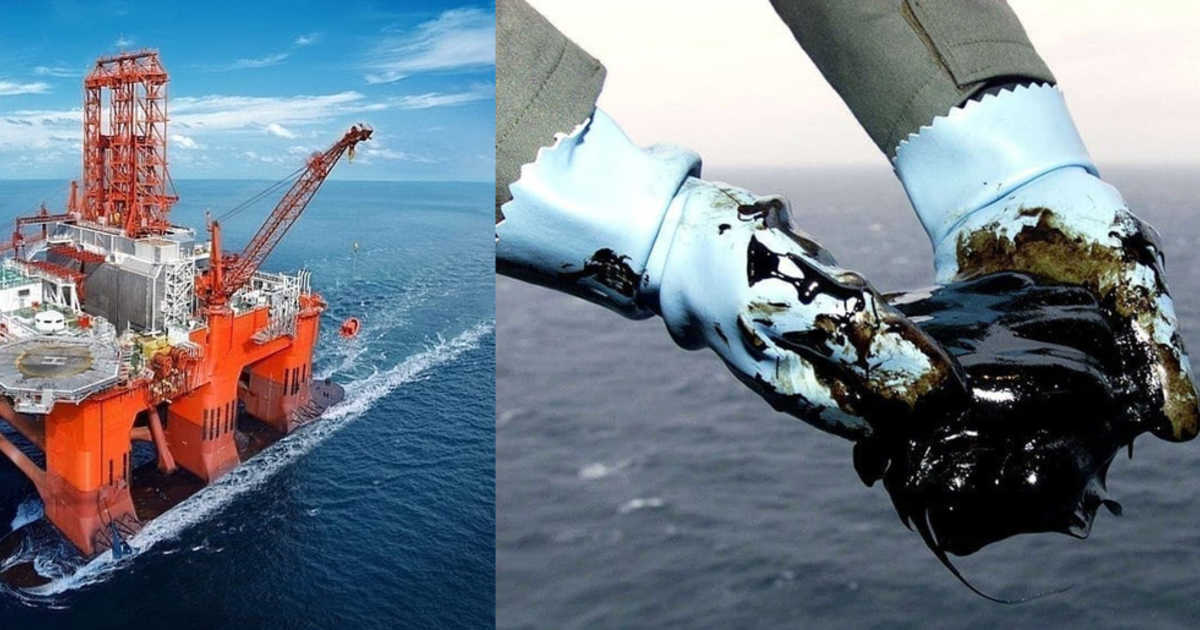The Lebanese petroleum expert Nicolas Sarkis recently uploaded a video on his Youtube channel exposing the outrageous corruption nested in the petroleum domain in Lebanon. He says that he had never seen, in any other country in his 40 or so years of work in petroleum, the amount of corruption that he saw first-hand in Lebanon.
Sarkis has worked as a petroleum consultant in numerous Arab and non-Arab petroleum-producing countries around the world during his decades-long career. Now, in light of the uprising in Lebanon and the serious focus on exposing and fighting corruption in the country, he has important insight to share with the public.
Here is what every Lebanese citizen should know about what goes on behind the scenes of Lebanon’s petroleum plans, as explained by Mr. Sarkis:
The Lebanese Petroleum Administration
To understand what goes on behind the scenes, you must first understand the forefront of the scene itself. The Lebanese Petroleum Administration is responsible for everything petroleum in Lebanon.
It was established on the 4th of December 2012 and is an independent public institution mandated to manage the upstream offshore petroleum sector in Lebanon.
Operating under the tutelage of the Minister of Energy and Water, the principal objective of the LPA is to contribute to creating the greatest possible value for the economy and the society out of the petroleum sector while protecting the environment.
It actively undertakes planning, regulatory, and supervisory roles across the petroleum industry, and plays critical roles during the initial licensing phase, as well as the many phases that follow.
Recently, caretaker Prime Minister Saad Hariri extended the terms of reference of the LPA, which had expired last year. This, as implied by Mr. Sarkis, is not a good thing, and it threatens the offshore natural resources of Lebanon.
Public opinion doesn’t know much about the process of petroleum-production. Those who do, work in Arab countries and countries that do produce the resource. Many of those experts could have been easily used by the Lebanese government to work on extracting petroleum for Lebanon, instead of importing it as it has always done.
According to the petroleum expert, the majority of the current six members of the LPA have nothing to do with petroleum; they have no experience in the field and are not eligible to work in the administration or the domain of offshore resources as a whole.
Like all public jobs in Lebanon, these six experts were chosen based on sects and religious denominations. The minister of power at the time of their employment handpicked the employees.
The LPA’s dangerous plan
The vast majority of petroleum-producing, as well as non-producing, countries have national companies dedicated to petroleum exploration, except for Lebanon, and a very select few others in the world.
Lebanon’s 2010 offshore petroleum resources law states that national petroleum companies should be created to help the state reach the supposed goal of becoming the main player in the processes leading to the production of its petroleum.
This goal is realized with the assistance of an international agreement called the Production Sharing Agreement.
The agreement states that any country that hasn’t discovered its petroleum resources, or has discovered them but hasn’t initiated the production process due to insufficient capital and/or a lack in the required expertise and tools, can accept to have foreign companies involved in the search and evaluation processes.
If none is found, the country is not required to pay the companies. If petroleum is found, on the other hand, the country and the foreign company become partners in the process of extraction and production, with the government owning a share of at least 40%.
As per the agreement, the country then pays back its share of expenses involved in the production process from the profit it receives after the petroleum had been extracted. This agreement is used in more than 70 countries around the world and is supposed to be in use in Lebanon as well, according to the law.
But in Lebanon, that is of course not the case. After the Lebanese Offshore Petroleum Resources Law was passed in 2010, several decrees were issued to complement it, as is normal for any law.
But what’s not normal is the fact that an article in one of the decrees says: “The state has no [participation] share in the first licensing round.”
To explain, in the bidding system used to organize petroleum exploration, each company or joint venture will offer a bid to gain the rights for the petroleum exploration at the license for a specified period of time (called a round).
The law in Lebanon explicitly states that the country does, in fact, have a share in the entire process of production with the implementation of the Production Sharing Agreement… Confused? Let me explain:

![]() @campingaourirmoroccoembedded via
@campingaourirmoroccoembedded via
This simply means that some government employees took it upon themselves to issue decrees that clearly broke the Offshore Petroleum Resources Law and unrightfully abolished Lebanon’s right to have a share in the first licensing round of its own petroleum. As Mr. Sarkis boldly said, the only word that can be used to describe this act is forgery…
A blind approval
The Council of Ministers at the time of PM Tammam Salam’s cabinet refused to approve the forged decrees for the clear unlawfulness present in them. Specifically in article number 5 of decree number 43.
However, after the resignation of PM Salam later on, and the election of the next government, the very first article discussed and approved in the first session of the Council of Ministers was article number 5 of the 43rd decree! The whole decree forgery issue was kept a secret from the public for obvious reasons.
What’s embarrassing is the fact that the decree, which was made up of tens of pages in English with a lot of technical, financial, and economic details, was handed to the ministers to study only 48 hours ahead of the time of the final approval or declination decision.
This allowed no time to discuss, or even to read, the texts in order to come up with a proper conclusion. All but two ministers approved the decree back then, and it became valid as a result.
Lebanon’s petroleum is now… Not Lebanon’s?
The extension of the terms of reference of the LPA, which previously introduced the unlawful article number 5, means that it will remain in control of Lebanon’s petroleum. It also means that foreign companies and, more dangerously, fake companies will take advantage of the country’s offshore resources…
In addition to introducing the article, the LPA, which works directly under the supervision of the Minister of Energy and Water, was also responsible for the approval process of the foreign companies that apply to work on Lebanon’s petroleum. Numerous companies were approved by the administration.
The administration also defined two categories of petroleum companies: operators and non-operators, with the operators being those which can undergo the practical work involved in the production process, like digging hundreds of meters down seabed at vast depths that could reach 2000m or more.
Here’s the problem: There are approximately 15 or so companies in the world that can perform such feats, including the French Total and its likes.

![]() @nada_boustani_khouryembedded via
@nada_boustani_khouryembedded via
The LPA approved 53 foreign companies to undergo the exploration and extraction processes, including the aforementioned top companies. Fifty-three foreign companies approved, but not a single national petroleum company was approved to be created in Lebanon, to produce the petroleum of Lebanon!
But that’s not all.
Among the 53 companies approved by the administration, there are many fake companies. One such example is a foreign company called Apex, which claims to be based in Hong Kong with a capital of $1,300…
According to Nicolas Sarkis, Apex has no offices, no telephone numbers, and no basis in the real world whatsoever. But it was simply approved anyway by the LPA and deemed eligible to work on Lebanon’s petroleum. Why? Because the fake company belongs to a Lebanese politician, who is currently active in the Council of Ministers.
The goal of these fake companies, which I hope has become clear at this point, is to allow corrupt politicians, businessmen, and other powerful individuals in Lebanon to take the opportunity and earn billions of dollars for themselves by stealing the Lebanese offshore national treasure of petroleum…
The details of the process are, briefly, as follows:
- A legitimate world-class operator company requests to work in Lebanon.
- The LPA approves the request on one condition: the operator must be accompanied by two non-operating (actually fake) companies that claim about 10% of the profit.
To put it more clearly, some very well-known Lebanese politicians and able businessmen are putting their hands on Lebanon’s petroleum to take the industry’s billions of dollars of profit for themselves and depriving the Lebanese of their right to use it to revive their country’s disastrous economy.
Lebanon’s petroleum has thus become split among the foreign operating companies that extract it on one hand, and the greedy politicians who only see that they get their 10% cut on the other.
All is not lost though.
The aforementioned decree allows the Lebanese government to do one thing: Ask the foreign companies to accept the assignment of a Lebanese supervisor to keep an eye on the work in progress. The supervisor attends the companies’ meetings and accordingly files reports to the Minister of Energy and Water… What a marvelous achievement!
The theft of Lebanon’s offshore resources is a crime committed by its very officials; the politicians whose job is to improve their country by the day and make living in it a more enjoyable experience for the citizens. Those responsible for the crimes must pay for their insolence towards their country and people.
The only resource that can give Lebanon a chance to get back on its feet is petroleum. And now this chance is being taken away by the greedy individuals who only selfishly care about their interests and disregard those of their suffering Lebanese people.
In response to this article based on Mr. Nicolas Sarkis’s video presentation, the acting chairman of the board of the Lebanese Petroleum Administration, Mr. Walid Nasr, contacted us with the following to share with you. We copy-paste:
Clarifications to the article released in The961 on 1 December 2019 entitled “Evidence Revealed That Corrupt Politicians Are Stealing Lebanon’s Petroleum” written by Hussein Yassine
The Lebanese Petroleum Administration (LPA) issued the following statement in reply to an article issued on the 1st of December 2019 on The961 website entitled “Evidence Revealed That Corrupt Politicians Are Stealing Lebanon’s Petroleum” by Hussein Yassine.
The abovementioned article quotes Nicolas Sarkis and contains factual and technical inaccuracies, as well as false analysis, that require clarifications in order to inform the public discourse and limit the spread of fake information.
In light of the approach of the scheduled exploration drilling in block 4, the LPA deems important to clarify the main fallacies addressed in this article:
- The Lebanese State developed a comprehensive legislative framework for the petroleum sector including laws and decrees which contain all transparency provisions adopted internationally. A specific Law was enacted to Enhance Transparency in the Oil and Gas Sector (Law 84/2018), which is published on the LPA’s website in addition to the two Exploration and Production Agreements for blocks 4 and 9 signed with companies as a result of the first offshore licensing round.
- The totality of the Offshore Petroleum Resources Law’s application decrees were issued as per the constitutional rules governing the issuance of decrees. Application decrees were issued by the Council of Ministers after the State Council ensured their legal compliance.
- All operational procedures that companies undertake in light of petroleum activities development are subject to the approval of the Council of Ministers or to the Minister of Energy and Water as per their mandate stipulated in the law and based on the opinion of the LPA.
- The Minister of Energy and Water and the LPA submit periodic reports to the Parliament regarding the progress of petroleum activities. The Parliament is the body which exercises an oversight role on the executive authority’s performance.
- As the sole owner of petroleum resources in its maritime borders, the State is an active participant in petroleum activities and it is a key partner in the Exploration and Production Agreements. What reinforces the active partnership the State exercises is that most of petroleum activities’ operational procedures are subject to the State’s approval, including but not limited to the following:
- The Minister of Energy and Water must approve the exploration plan.
- Drilling cannot start before the Minister of Energy and Water approves and issues a drilling permit.
- The Council of Ministers approves the extension of the exploration phase.
- The Council of Ministers approves the development and production plan.
- The Minister of Energy and Water approves and issues an annual production permit upon which production is conditional to start.
- The Minister of Energy and Water approves the sale of the State share of petroleum based on the opinion of the LPA.
- All companies that have been pre-qualified to participate in the first licensing round possess the legal, technical, financial, and quality, health, safety and environmental criteria as specified in the pre-qualification decree.
- The Total Government Take is composed of royalty, profit petroleum and taxes and varies between 53 and 71% in blocks 4 and 9 which were awarded during the first licensing round.
- The condition upon which a National Oil Company (NOC) can be established is stipulated in Article 6 of the Offshore Petroleum Resources Law (OPRL Law 132/2010). Article 6 of the OPRL stipulates that an NOC can be established after promising commercial discoveries are made.
It should be noted that the State does not bear any investment costs pursuant to the production sharing system. Instead the consortium bears the financial risks associated with exploration activities and start recovering their costs at the start of production once a commercial discovery is made.
The LPA is permanently ready to provide information for those wishing to obtain it as well as evidence refuting distorted facts and erroneous statements that could be circulating. The LPA invites you to check its website at www.lpa.gov.lb
–End of Quote–






























